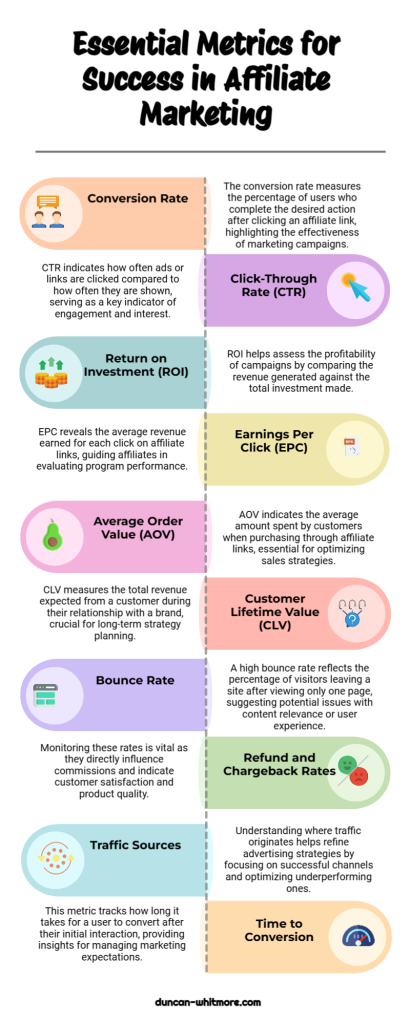Measure Success in Affiliate Marketing: Ten Essential Metrics
By Duncan Whitmore
Affiliate marketing is both an art and a science. Getting sales is fabulous, but to grow and optimize every campaign, it's essential for you to look deeper, carrying out an analysis of your data.
The truth is, success isn’t just about the number of sales; it's about understanding what drove those sales and how to replicate that across campaigns.
So, which metrics should you be keeping an eagle eye on as an affiliate marketer?
Here are the top ten metrics to track to measure success in affiliate marketing.
1. Conversion Rate
At the heart of every marketing campaign lies the conversion rate. This is the metric that tells you the percentage of people clicking on your affiliate link who actually made a purchase or completed a desired action.
Calculated as the number of conversions divided by the total number of visitors, this figure reveals which campaigns are performing well and which might need refining.
In essence, it's your campaign's effectiveness captured in a single number.
2. Click-Through Rate (CTR)
CTR is pivotal. It measures how often people who see your ad or link end up clicking on it.
This is calculated by dividing the number of clicks by the number of impressions.
A high CTR is usually a good indicator that your ad is engaging and interests your audience.
If your CTR is low, it might be time to reconsider your ad copy or creative.
3. Return on Investment (ROI)
This is the mother of all metrics when it comes to knowing whether your campaigns are truly worth it. ROI calculates the gains or losses generated relative to your initial investment.
For affiliate marketers, ROI can sometimes be tough to attribute because it involves costs like time and resources as well as monetary investment.
However, it's crucial to at least estimate this to measure success in affiliate marketing comprehensively.
4. Earnings Per Click (EPC)
Affiliates love the EPC metric as it gives a clear picture of the value per click. It tells you how much income you're generating from each click on your affiliate links.
This is important when deciding which products or services are worth your time and effort, especially when comparing different affiliate programs.
5. Average Order Value (AOV)
AOV is an extremely useful metric for affiliates who work on a commission basis. It allows you to understand how much customers are spending on average when they purchase through your affiliate links.
By knowing the AOV, you can optimize your strategies to boost sales and increase commissions.
For instance, if the AOV is lower than expected, consider promoting higher-priced products or bundling suggestions.
6. Customer Lifetime Value (CLV)
Affiliates often overlook this metric, but knowing the CLV will give you insight into the total revenue you can expect from a customer over the duration of their relationship with the brand.
Essentially, the higher the CLV, the more valuable the customer is.
This metric is particularly relevant for subscription-based or recurring revenue products.

7. Bounce Rate
Simply put, the bounce rate is the percentage of visitors who leave your site after viewing just one page.
A high bounce rate might suggest that visitors don’t find what they're looking for upon arrival — indicating potential problems with your landing page or that your marketing message is misaligned.
Improving content and providing a seamless user experience can help reduce bounce rates and retain more traffic.
8. Refund and Chargeback Rates
Though not the most glamorous of metrics, refund and chargeback rates need to be monitored closely as they directly impact commissions and customer satisfaction.
High rates could suggest issues with the product quality, misleading product descriptions, or the audience you're targeting.
Addressing these issues can lead to more satisfied customers and fewer sales reversals.
9. Traffic Sources
Understanding where your traffic is coming from — be it through referrals, search engines, or social media — is key to refining your promotional strategies.
Knowing your primary traffic sources helps you invest in the right channels and understand which campaigns are outperforming others.
So refine your strategies to bolster underperforming sources and boost already successful ones.
10. Time to Conversion
Time to conversion tracks how long it takes for a prospect to convert after their first interaction with your affiliate link.
This metric can be especially telling for products that require more consumer education or have a longer decision-making process.
By understanding time to conversion, you can better calibrate campaigns and manage expectations around results.
Conclusion
To measure success in affiliate marketing effectively, tracking a variety of metrics is essential. While these ten metrics are a great starting point, remember that the digital marketing arena is changing continuously, so be sure to refine and adapt your tracking strategies.
Knowing your numbers not only boosts your bottom line but empowers you to stay competitive in a crowded market. As the saying goes, “What gets measured gets improved.”
So, start monitoring, start optimizing, and growth in your affiliate marketing ventures is sure to follow.
* * * * *




